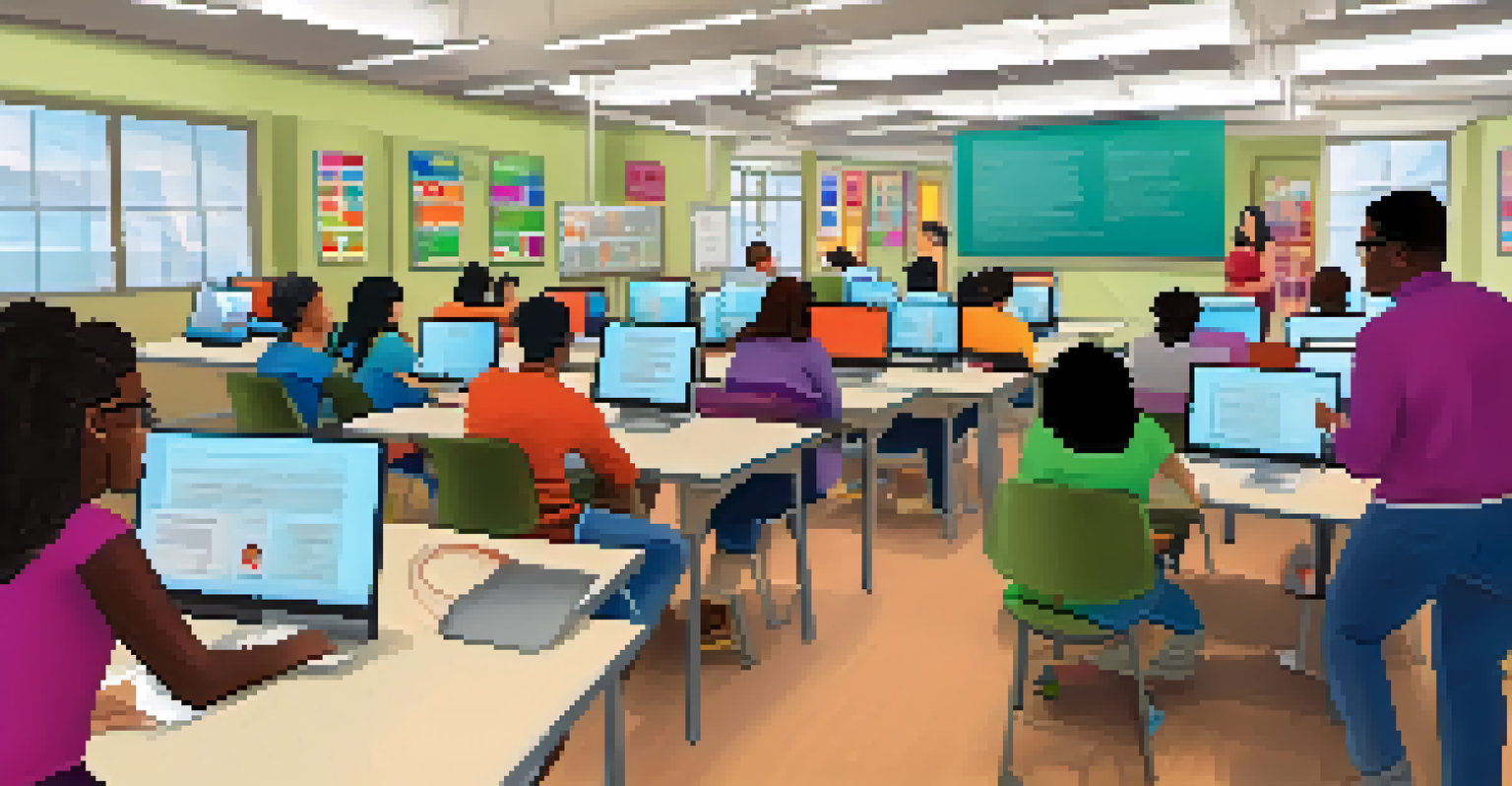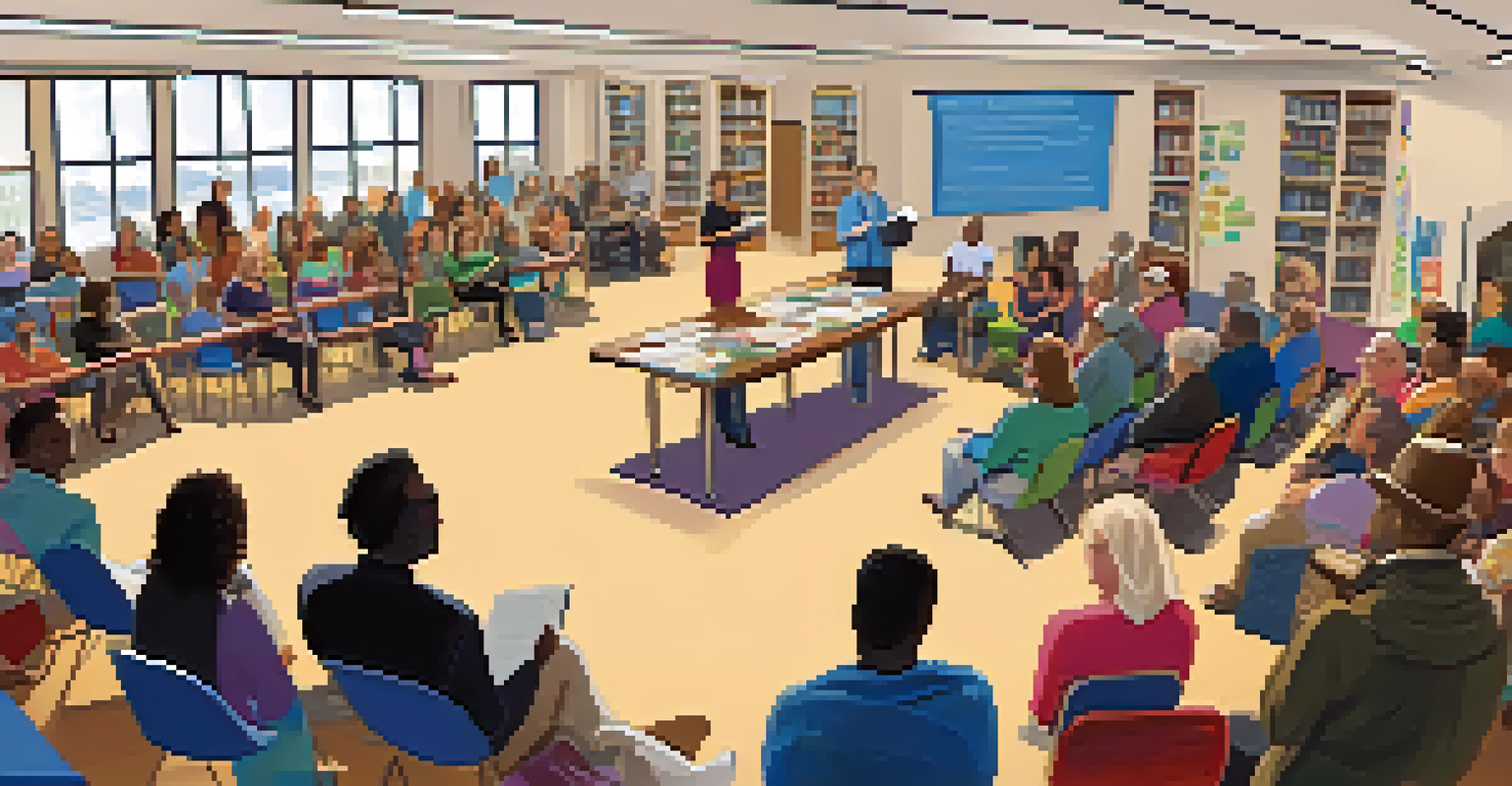Exploring Public Libraries: Key Role in Literacy Programs

The Historical Role of Libraries in Literacy Development
Public libraries have long been cornerstones of literacy in communities. They provide access to books and resources that empower individuals to learn and grow. Throughout history, libraries have served as safe spaces for people of all ages to improve their reading skills and gain knowledge.
A library is not a luxury but one of the necessities of life.
In the early days, libraries focused on providing educational resources primarily to adults. However, as the importance of childhood literacy became clear, libraries expanded their offerings to include programs tailored for children and young adults. This evolution reflects the understanding that literacy is a lifelong journey.
Today, libraries not only house books but also facilitate workshops, reading programs, and family literacy events. They have adapted to meet the changing needs of their communities, making literacy accessible to everyone, regardless of age or background.
Key Literacy Programs Offered by Public Libraries
Public libraries offer a variety of literacy programs designed to cater to diverse audiences. From early childhood story hours to adult literacy classes, these programs aim to engage individuals at different stages of their reading journey. For example, many libraries host 'Read to a Dog' programs where children can practice reading aloud in a friendly environment.

Additionally, libraries often provide resources for English as a Second Language (ESL) learners. These programs help non-native speakers improve their language skills and integrate more effectively into their communities. By offering free classes and conversation groups, libraries play a crucial role in breaking down language barriers.
Libraries Empower Lifelong Literacy
Public libraries provide essential resources and programs that support literacy development for individuals of all ages.
Moreover, some libraries have initiatives focused on digital literacy, teaching patrons how to navigate technology and access online resources. In an increasingly digital world, these skills are essential for personal and professional growth, making libraries vital hubs for modern literacy.
The Importance of Community Engagement in Literacy Programs
Community engagement is at the heart of successful literacy programs in public libraries. By collaborating with local schools, organizations, and volunteers, libraries can create programs that reflect the needs and interests of their communities. This approach not only enhances participation but also fosters a sense of belonging among patrons.
The only thing that you absolutely have to know, is the location of the library.
For instance, many libraries partner with schools to provide resources and support for students struggling with reading. These partnerships can lead to after-school tutoring sessions or summer reading challenges that encourage kids to keep learning even when school is out. Such initiatives help bridge the gap between educational institutions and the community.
Furthermore, involving local authors and educators in programming can enrich the library experience. When community members see familiar faces leading workshops or reading events, it builds trust and encourages more people to take part in literacy activities.
The Role of Technology in Modern Library Literacy Programs
As technology continues to evolve, public libraries are embracing digital tools to enhance literacy programs. Many libraries now offer e-books, audiobooks, and online databases that make reading more accessible. This digital shift allows patrons to engage with materials in ways that suit their preferences and lifestyles.
Additionally, libraries are incorporating technology into their literacy programs by providing computer classes and access to educational software. These resources are particularly valuable for individuals seeking employment or looking to improve their skills. By teaching patrons how to utilize these tools effectively, libraries empower them to succeed in today's job market.
Community Engagement Enhances Programs
Collaboration with local schools and organizations helps libraries create relevant literacy programs that meet community needs.
Moreover, virtual storytimes and online book clubs have gained popularity, especially during the pandemic. Libraries have adapted to provide engaging digital experiences that keep the community connected and promote literacy even when in-person gatherings are not possible.
Challenges Faced by Public Libraries in Literacy Initiatives
While public libraries play a crucial role in promoting literacy, they face several challenges in their initiatives. Budget constraints can limit the resources available for literacy programs, making it difficult to offer a wide range of services. Many libraries are tasked with doing more with less, which can impact the quality and accessibility of their programs.
Additionally, reaching underserved populations can be a significant hurdle. Libraries often strive to serve all community members, but barriers such as transportation, language, and lack of awareness can prevent some individuals from participating. Developing targeted outreach strategies is essential to ensure that everyone can benefit from literacy initiatives.
Finally, keeping up with the rapid pace of technological change presents its own set of challenges. Libraries must continually adapt their programs to incorporate new tools and platforms, which can require ongoing training for staff and additional funding for resources.
Success Stories: The Impact of Literacy Programs on Communities
Public libraries have countless success stories that highlight the positive impact of their literacy programs. For example, many libraries report significant improvements in reading levels among children who participate in summer reading challenges. These programs not only boost literacy skills but also instill a love for reading that lasts a lifetime.
Moreover, adult literacy programs have transformed lives by helping individuals gain essential skills needed for employment. Many participants have gone on to secure jobs, pursue further education, or achieve personal goals that seemed unattainable before. These stories serve as powerful reminders of the transformative power of literacy.
Technology Shapes Modern Literacy
The integration of digital tools and resources in libraries enhances literacy initiatives and makes learning more accessible.
Libraries also share success stories through community events, showcasing the achievements of their patrons. By celebrating these milestones, they inspire others to take part in literacy programs and foster a culture of learning and growth within the community.
The Future of Literacy Programs in Public Libraries
Looking ahead, the future of literacy programs in public libraries appears promising. As communities continue to evolve, libraries are likely to adapt their offerings to meet changing needs. This may include more focus on digital literacy as technology becomes increasingly integrated into daily life.
Moreover, the emphasis on inclusivity will likely drive libraries to develop programs that cater to diverse populations. Libraries might explore collaboration with local organizations to create tailored initiatives for various demographic groups, ensuring that everyone has the opportunity to engage in literacy activities.

Finally, public libraries will continue to be vital resources for lifelong learning, supporting individuals at every stage of their literacy journey. By fostering a love for reading and providing essential skills, libraries will remain key players in promoting literacy and enriching their communities.